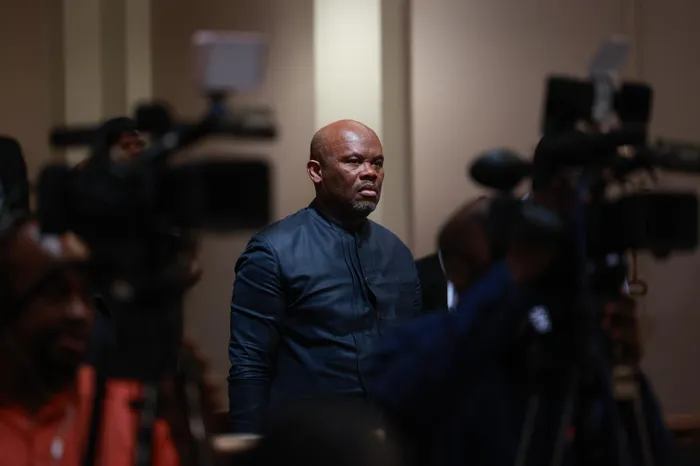
Top cop Shadrack Sibiya in court.
Image: Oupa Mokoena / Independent Newspapers
DEPUTY National Police Commissioner Lieutenant-General Shadrack Sibiya was dealt a huge blow when the Gauteng High Court, Pretoria dismissed his urgent application to return to work and slapped him with a cost order.
Sibiya turned to court for an urgent order to return to work after Police Commissioner Fannie Masemola issued him with a stay-at-home order, pending an investigation and to interdict Masemola from instituting a process parallel to the judicial commission of inquiry into criminality, political interference, and corruption in parts of the criminal justice system.
The commission was established by President Cyril Ramaphosa and will be chaired by retired Acting Deputy Chief Justice Mbuyiseli Madlanga.
Sibiya had asked the court for an order declaring that Masemola’s decision to direct him to “stay at home, pending an investigation” was unlawful and for it to be set aside.
It was argued on his behalf that Masemola had no power to issue the stay-at-home order as this is not provided for in the SAPS discipline regulations. But Judge Norman Davis said it's clear that at the time the commissioner gave the order, he did not purport to act in terms of the discipline regulations.
In a 34 page judgment, penned by Judge Davis, the court found the argument by Sibiya’s counsel that the stay-at-home-order is a disguised precautionary suspension, is not supported by the facts. Judge Davis said the instruction to stay at home was not unlawful.
“The instruction was neither seen nor implemented as a suspension. It did not impact on the applicant’s remuneration, employment or security,” the judge said.
It was also found that Sibiya does not have the right to have disciplinary proceedings against him halted or suspended. “The right which the applicant seeks to assert is a self constructed right,” Judge Davis said.
He added that Sibiya misconstrues the nature of the commission. Although the commission can, at the end of its investigation, make recommendations to the president, it is neither a court nor a disciplinary tribunal.
Sibiya argued that separate disciplinary proceedings against him will interfere and obstruct the work of the commission. But the court said there is no factual basis for this assertion. Judge Davis said a disciplinary hearing running parallel with the commission, will not affect any findings which the commission may independently make.
“Simply put, the disciplining of the applicant and the work of the commission are two separate things, even if the applicant’s motive for disobeying an order may be of interest to the commission.”
Judge Davis noted that Sibiya, in a last ditch attempt, contends that Masemola is biased towards him and this is the reason why the commission would be the appropriate body to discipline him. But the judge said Sibiya once again misconstrues the function and powers of the commission.
“We therefore find that the applicant has not established a prima facie right to have the envisaged disciplinary proceedings against him halted, suspended or stayed,” Judge Davis said.
Regarding Sibiya’s argument that a disciplinary process would expose him to the harm of double jeopardy, the judge once again pointed out that the commission does not sit as a tribunal, nor as a court of law.
Judge Davis said there is also no evidence of any reasonable apprehension that Sibiya would not be able to put forward his version before an independent disciplinary tribunal.
The court found that Sibiya’s application was not premised on the Constitution and thus, in turning down his application, slapped him with the legal costs.
Cape Times
Related Topics: